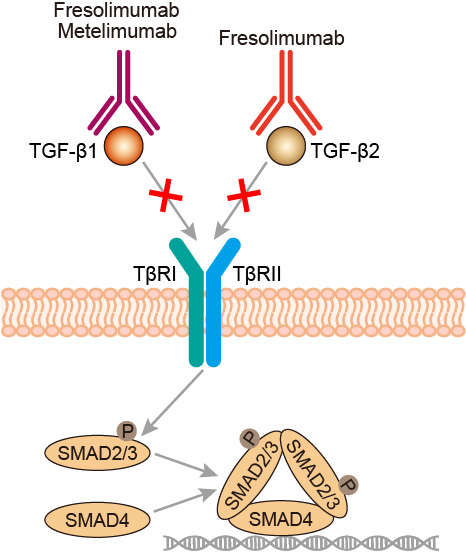

Metelimumab Overview
Introduction of Metelimumab
Metelimumab (CAT-192) is a human IgG4 monoclonal antibody (mAb) that neutralizes transforming growth factor beta 1 (TGF-β1) which had been chosen for further development for the treatment of diffuse cutaneous systemic sclerosis, also known as scleroderma. Metelimumab was isolated by Cambridge Antibody Technology (CAT) using its phage display technology. In 2000, CAT signed a collaborative deal with Genzyme to further develop TGF beta antibodies. In 2004, CAT and Genzyme revealed that Phase I/II trials of metelimumab for scleroderma showed this antibody to be safe and well tolerated across all dose levels, although no conclusions regarding efficacy of the compound could be made. Initial trials targeted the skin condition scleroderma but, after some unsuccessful clinical trial results, the product was dropped in favour of fresolimumab, which is currently being developed by Genzyme.
Mechanism of Action of Metelimumab
TGF-β1 is a polypeptide member of the transforming growth factor beta (TGF-β) superfamily of cytokines. TGF-β is a pleiotropic cytokine that is a member of a superfamily of ligands that includes bone morphogenetic proteins and activins. Under normal conditions, TGF-β helps to maintain homeostasis and limit the growth of epithelial, endothelial, neuronal, and hematopoietic cell lineages through anti-proliferative and apoptotic responses. In addition, TGF-β exerts potent effects that influence immune function, differentiation, adhesion, extracellular matrix production, cell motility, angiogenesis, and cytokine production. Early in the transition of premalignant lesions into malignant neoplasms, TGF-β can suppress cell growth; however, in advanced cancers these effects are typically lost. Instead, TGF-β will directly promote tumor growth and metastases. TGF-β-induced cellular changes have been described in many different tumor models and appear to be important for inducing cell migration and promoting metastases. TGFβ also attenuates host antitumor immune responses. With broad activity in natural killer (NK) cells, T cells including T regulatory cells, NKT cells, monocytes/macrophages, and dendritic cells, TGFβ can down-regulate both primary and secondary immune responses and suppress antitumor effector cells. Metelimumab binds to and inhibits the activity of all isoforms of TGF-β1, resulting in the inhibition of tumor cell growth, angiogenesis, and migration, and thereby shows its’ anti-tumor therapeutic efficacy.
 Fig.1 Mechanism of action of Metelimumab
Fig.1 Mechanism of action of Metelimumab
What We Provide
Therapeutic Antibody
Metelimumab
We provide high-quality Metelimumab for use in WB, FC, IP, ELISA, Neut, FuncS, IF and most other immunological methods. For lab research use only, not for diagnostic, therapeutic or any in vivo human use.
For research use only. Not intended for any clinical use.
This site is protected by reCAPTCHA and the Google Privacy Policy and Terms of Service apply.

